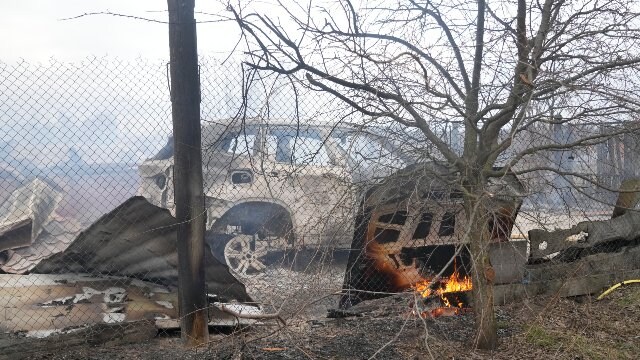Ukraine’s nuclear regret: A look back at when and why Kyiv gave up its arsenal
After the collapse of the Soviet Union, thousands of nuclear arms, about one third of the Soviet nuclear arsenal, were left on Ukrainian soil by Moscow

Russia launched an assault on Ukraine on Thursday morning. AP
As Russia initiated a military operation against Ukraine on Thursday, the notes of regret couldn’t be missed in the voice of Ukrainian MP Alexey Goncharenko as he recalled how his country gave up nuclear weapons in exchange for security guarantees from Russia and the US.
“Ukraine is the only nation in the human history which gave up the nuclear arsenal, the third biggest in the world in 1994, with guarantees of the US, UK and Russian Federation. Where are these guarantees? Now we are bombed and killed,” Goncharenko said while talking to Fox News.
Follow LIVE updates of the Russia-Ukraine conflict HERE
Ukraine’s former defence minister Anriy Zahorodniuk also expressed regret at denuclearisation.
“We gave away the capability for nothing,” Zahorodniuk told The New York Times.
Why did the country with the “third biggest” nuclear arsenal in the world give it all up? What were the security guarantees from Russia and the US?
Let’s take a look back:
Ukraine’s nuclear arsenal
Once the second most powerful republic in the Soviet Union (USSR), Ukraine voted for independence on 1 December, 1991. With independence came the tag of being the third-largest nuclear power in the world, but only briefly.
After the collapse of the Soviet Union, thousands of nuclear arms, about one third of the Soviet nuclear arsenal, were left on Ukrainian soil by Moscow.
According to the Federation of American Scientists (FAS), Ukraine had approximately 3,000 tactical nuclear weapons that are meant to hit large military facilities, naval fleets and armoured formations, and 2,000 strategic nuclear weapons that are meant to destroy cities.
Despite having the third largest nuclear arsenal in the world, the authority to use the centralised firing control of these weapons remained in Moscow.
Ukraine’s denuclearisation under Budapest Memorandum
Extensive negotiations between Ukraine, Russia, the UK and the US led to an agreement called the Budapest Memorandum.
As per the agreement, Ukraine agreed to dismantle its nuclear arsenal and delivery systems such as bombers and missiles with financial assistance from the West.
Ukraine agreed to its accession to the Treaty on the Non-Proliferation of Nuclear Weapons (NPT) as a non-nuclear weapon State.
The agreement assured Ukraine that Russia, US and UK would refrain from threatening it and respect its “independence and sovereignty and the existing borders”.
The six paragraph-agreement also assured Ukraine that the other three signatories will “refrain from the threat or use of force against the territorial integrity or political independence of Ukraine, and that none of their weapons will ever be used against Ukraine except in self-defence or otherwise in accordance with the Charter of the United Nations”.
It said that all the three signatories will not use economic coercion against Ukraine to secure advantages of any kind.
The three countries agreed to seek immediate action from the United Nations Security Council to provide assistance to Ukraine if it becomes “the victim of an act of aggression or an object of a threat of aggression in which nuclear weapons are used”.
The countries committed to not use nuclear weapons “against any non-nuclear-weapon State party to the Treaty on the Non-Proliferation of Nuclear Weapons, except in the case of an attack on themselves, their territories or dependent territories, their armed forces, or their allies, by such a State in association or alliance with a nuclear-weapon State”.
All the four parties in the Budapest Memorandum agreed to consult “in the event a situation arises that raises a question concerning these commitments”.
Russia’s violation of Budapest Memorandum
Russian takeover of Crimea in Ukraine’s territory in 2014 was considered a violation of the Budapest Memorandum. Putin, however, rejected the criticism calling the Budapest Memorandum invalid as it had been signed with a previous Ukrainian government.
Putin earlier this week claimed that Ukraine was still in possession of Soviet nuclear technology and wanted to make its own nuclear weapons.
“We know that there have already been reports that Ukraine wants to make its own nuclear weapons. This is no empty boast. Ukraine in fact still has Soviet nuclear technology and delivery systems for such weapons,” Putin had said, according to Russian news agency TASS.
With inputs from agencies
Read all the Latest News, Trending News, Cricket News, Bollywood News,
India News and Entertainment News here. Follow us on Facebook, Twitter and Instagram.
also read

EU to adopt Russia sanctions after Putin's recognition of Ukrainian separatist regions
On Tuesday, Russia recognised Ukraine's Donetsk and Luhansk separatist regions, in the most serious escalation in the conflict in recent months. It also ordered deployment of peacekeepers to the area

'Ukraine is the shield against Russia,' Zelensky urges West to give clear timeframe on NATO membership
The remarks came on the day the Ukraine Army said that two of its soldiers died in attacks on the frontline with Russia-backed separatists, the first fatalities in the conflict in more than a month

Russia-Ukraine war LIVE Updates: PM Modi likely to speak to Vladimir Putin tonight; EU still undecided on whether to cut Russia from global payment network
Russia-Ukraine war LIVE Updates: This comes after the Ukrainian ambassador to India Igor Polikha on Thursday sought Prime Minister Narendra Modi's support amid the ongoing military operation from Russia in Ukraine